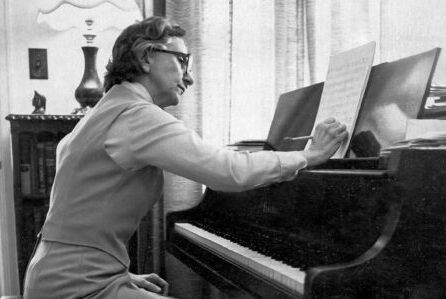
Canada
Violet Archer (Ballestreri) (1913-2000) was a Canadian composer, musician, and music teacher of Italian descent. She studied the piano and the organ at McGill Conservatory (now known as Schulich School of Music), and composing at McGill University. Between 1940 and 1947, she was a percussionist in the Montreal Women's Symphony Orchestra, taught musical theory and piano, and worked as an accompanist. Her interest in composing was already present in her adolescence in the 1930s. Scherzo Sinfonico was her first publicly performed work (Montreal Orchestra, conducted by Douglas Clarke, 1940). She found recognition when her piece Britannia: A Joyful Overture (1941) was selected to be performed at the BBC and recorded for the armed forces in Europe. She furthered her training with Béla Bartók in New York during the Summer of 1942, then with Paul Hindemith at Yale in 1948 and 1949, obtaining a Master’s degree in music and winning the Wood-Chandler prize for The Bell. Between 1950 and 1953, Violet Archer was composer in residence at North Texas State College (now University of North Texas), where she also studied musicology. In 1962, she was hired as professor of composition at the University of Alberta, a position she would remain in until she retired in the 1990s.
Artistically, her musical approach was first tied to the neoclassical trends prevalent in the interwar period, sticking to traditional composition methods based on tonal writing and formal structures. She would later move away from this approach under the influence of Bartók and Hindemith, who would leave their mark on her musical style, widening her vocabulary. Her music became more dissonant, developing a composite language incorporating various modernist techniques and moving away from the strictly classical tonal anchoring – though without shedding it completely. She was particularly influenced by Hindemith’s harmonic system, which she reused in her own works, while taking certain liberties as her style matured. Her music is sometimes also marked by the influence of Schoenberg, though she never fully embraced that doctrine. Certain passages and pieces occasionally present the sombre and anxious aspect of the expressionist aesthetic. Open to and curious about the innovations and evolution of composition, she also trained in electronic composition techniques at London’s Goldsmith College late in her career.
Her work was extremely prolific, with over 330 pieces, and is characterised by its versatility – opéras-comiques, music for documentaries, and even electronic music in the 1970s, among many other styles. She won numerous awards and honours over the course of her career, including the Order of Canada in 1983, Alberta’s Life Achievement Award in 1990, the Canada 125 prize in 1992, the International Biographical Centre’s title of International Woman of the Year in 1993, as well as the American Biographical Institute’s Woman of the Year and Most Admired Woman of the Decade the same year. Archer is regularly described as one of the most important figures of Canadian music history.
– Frédérick Duhautpas –
[Traduction en anglais : Raphaël Meyer]
She took the name “ARCHER” in 1940, an English translation of her birth name “BALESTRERI”.
Artistically, her musical approach was first tied to the neoclassical trends prevalent in the interwar period, sticking to traditional composition methods based on tonal writing and formal structures. She would later move away from this approach under the influence of Bartók and Hindemith, who would leave their mark on her musical style, widening her vocabulary. Her music became more dissonant, developing a composite language incorporating various modernist techniques and moving away from the strictly classical tonal anchoring – though without shedding it completely. She was particularly influenced by Hindemith’s harmonic system, which she reused in her own works, while taking certain liberties as her style matured. Her music is sometimes also marked by the influence of Schoenberg, though she never fully embraced that doctrine. Certain passages and pieces occasionally present the sombre and anxious aspect of the expressionist aesthetic. Open to and curious about the innovations and evolution of composition, she also trained in electronic composition techniques at London’s Goldsmith College late in her career.
Her work was extremely prolific, with over 330 pieces, and is characterised by its versatility – opéras-comiques, music for documentaries, and even electronic music in the 1970s, among many other styles. She won numerous awards and honours over the course of her career, including the Order of Canada in 1983, Alberta’s Life Achievement Award in 1990, the Canada 125 prize in 1992, the International Biographical Centre’s title of International Woman of the Year in 1993, as well as the American Biographical Institute’s Woman of the Year and Most Admired Woman of the Decade the same year. Archer is regularly described as one of the most important figures of Canadian music history.
– Frédérick Duhautpas –
[Traduction en anglais : Raphaël Meyer]
She took the name “ARCHER” in 1940, an English translation of her birth name “BALESTRERI”.
List of Works
Contributor:
Présence Compositrices - last updated 16 December 2024